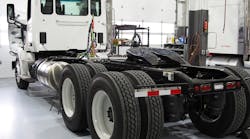Fleet owners across the country acknowledge that regular vehicle maintenance is vital to keeping their operation running smoothly. While checking the oil, filters and odometer is usually top-of-mind, the importance of grease is often overlooked.
From the point of application to the type of grease you’re using, the following habits can keep equipment running longer and more consistently — no matter your work load.
Switch grease seasonally
As we head into summer, use a grease that is designed to withstand hotter temperatures. If operators used a NLGI #1 grade grease during colder months, it’s likely time to switch to a NLGI #2 grade grease in advance of warmer weather.
“You can have the same chemistry and the same lubrication properties in a #1 and a #2,” says Andrew Hamilton, director of Lubricants, Technical Services at CHS. “The only difference is that a #1 is less dense, so it flows easier in cold weather.”
Lower density makes #1 grease ideal for cool temperatures because it’s less likely to stiffen. However, this increased viscosity means that higher temperatures can leave it thinner and unable to provide proper protection. Insufficient lubrication leads to excessive friction, which spells eventual breakdown. Generally, a #2 grease is used in spring, summer and fall, while a #1 grease is only used as part of a winter grease program.
Know the equipment’s grease points and which type of grease each requires
Grease isn’t just for the yoke on the fifth wheel or the axle. It’s important to understand that not all grease points take the same lubrication. “There’s at least five or six additional grease points between the axle, steering and the truck or tractor itself,” says Hamilton. “And the grease you put on the fifth wheel, with all that sliding contact and high-force pressure, is different than the type of grease needed for bearings.”
Multi-purpose products can be especially tempting; however, there are very few products that can truly serve both sliding equipment components and bearings. For instance, sliding components like an axle do better with a grease that contains molybdenum disulfide, or “moly,” like Cenex Maxtron® EP. On the other hand bearings need additional protection against water washout and will perform better with a polyurea-based product, like Cenex Poly-Xtreme.
Understanding what grease needs to do and why quality matters
Each component of your equipment faces unique demands, meaning different products may be required to maintain equipment efficiency during long haul duty cycles. An over-the-road truck may need multiple greases applied weekly due to the miles accumulated over long days of continuous operation. Owners and operators need quality products that they can depend on, whether that’s providing lubrication during extreme weather or enduring an intensive work cycle.
“There’s nothing to gain by taking shortcuts on cheap grease,” says Hamilton. “When using premium synthetics or synthetic blends, or anytime a grease has ‘complex’ in its name, it’s good to understand that there is a higher degree of thickener and technology being used, so it’s going to cost a little bit more.”
Grease only accounts for about 1 to 2 percent of total fleet operation costs, but it can extend the life of equipment for years. While it seems like an afterthought, a grease program isn’t the place to skimp. Modern synthetic lubricants, which can seem like a larger upfront investment, generally come with technology for better dual-phase lubrication. Both the oil and the thickener in the formula provide lubrication, but they do so differently. The difference is important for how a product performs in machinery and reinforces the need for both ingredients to be high-quality.
“People tend to think all greases are the same, but nothing could be further from the truth,” says Hamilton. “Grease has a ton of technology in it. And using specialized products will provide the best lubrication for your equipment.”
A holistic maintenance schedule for any fleet should include a thorough lubrication program. Consistently applying the most effective grease to the right moving parts can extend the life of your fleet and decrease equipment downtime due to improper maintenance. To find the best grease for your rigs and equipment, reference your vehicle’s owner’s manual or use the Cenex equipment look-up tool. To learn more about how to implement the best grease program for your fleet, visit Cenex.com.



